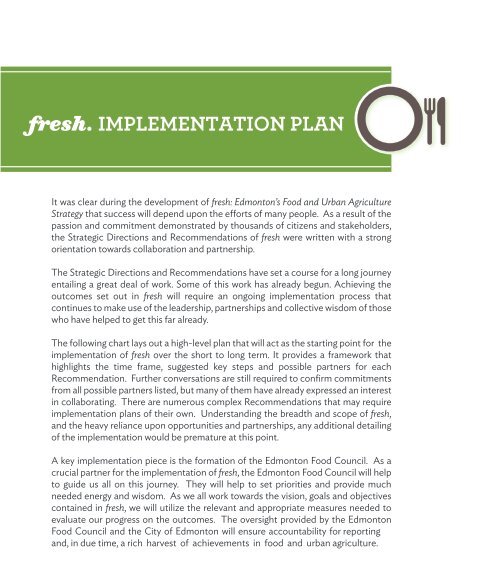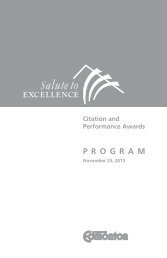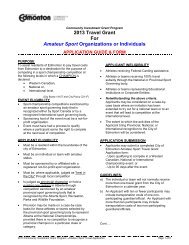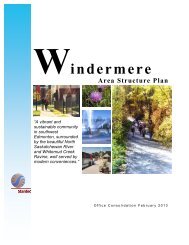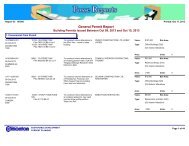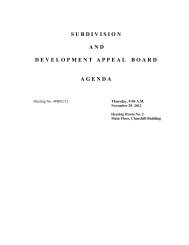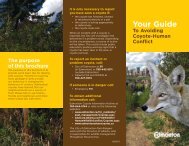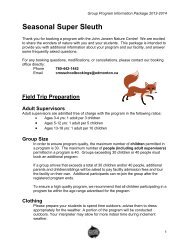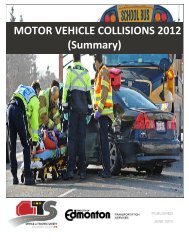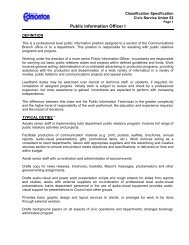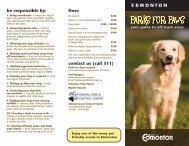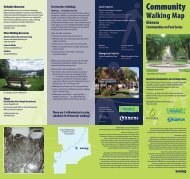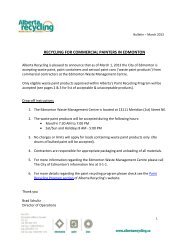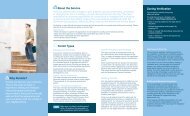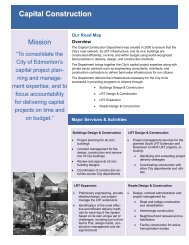fresh: Implementation Plan - City of Edmonton
fresh: Implementation Plan - City of Edmonton
fresh: Implementation Plan - City of Edmonton
Create successful ePaper yourself
Turn your PDF publications into a flip-book with our unique Google optimized e-Paper software.
<strong>fresh</strong>. IMPLEMENTATION PLAN<br />
It was clear during the development <strong>of</strong> <strong>fresh</strong>: <strong>Edmonton</strong>’s Food and Urban Agriculture<br />
Strategy<br />
passion and commitment demonstrated by thousands <strong>of</strong> citizens and stakeholders,<br />
the Strategic Directions and Recommendations <strong>of</strong> <strong>fresh</strong> were written with a strong<br />
orientation towards collaboration and partnership.<br />
The Strategic Directions and Recommendations have set a course for a long journey<br />
entailing a great deal <strong>of</strong> work. Some <strong>of</strong> this work has already begun. Achieving the<br />
outcomes set out in <strong>fresh</strong> will require an ongoing implementation process that<br />
continues to make use <strong>of</strong> the leadership, partnerships and collective wisdom <strong>of</strong> those<br />
who have helped to get this far already.<br />
The following chart lays out a high-level plan that will act as the starting point for the<br />
implementation <strong>of</strong> <strong>fresh</strong> over the short to long term. It provides a framework that<br />
highlights the time frame, suggested key steps and possible partners for each<br />
Recommendation. Further conversations are still required to confirm commitments<br />
from all possible partners listed, but many <strong>of</strong> them have already expressed an interest<br />
in collaborating. There are numerous complex Recommendations that may require<br />
implementation plans <strong>of</strong> their own. Understanding the breadth and scope <strong>of</strong> <strong>fresh</strong>,<br />
and the heavy reliance upon opportunities and partnerships, any additional detailing<br />
<strong>of</strong> the implementation would be premature at this point.<br />
A key implementation piece is the formation <strong>of</strong> the <strong>Edmonton</strong> Food Council. As a<br />
crucial partner for the implementation <strong>of</strong> <strong>fresh</strong>, the <strong>Edmonton</strong> Food Council will help<br />
to guide us all on this journey. They will help to set priorities and provide much<br />
needed energy and wisdom. As we all work towards the vision, goals and objectives<br />
contained in <strong>fresh</strong>, we will utilize the relevant and appropriate measures needed to<br />
evaluate our progress on the outcomes. The oversight provided by the <strong>Edmonton</strong><br />
Food Council and the <strong>City</strong> <strong>of</strong> <strong>Edmonton</strong> will ensure accountability for reporting<br />
and, in due time, a rich harvest <strong>of</strong> achievements in food and urban agriculture.
ESTABLISH THE EDMONTON FOOD COUNCIL<br />
Recommendation<br />
Suggested Key Steps<br />
Status Lead Possible Partners<br />
Establish the <strong>Edmonton</strong><br />
Food Council (EFC) by<br />
June 1, 2013<br />
– Create Terms <strong>of</strong> Reference<br />
– Call for nominations<br />
– Screen candidates<br />
– Select and appoint members<br />
Sustainable<br />
Development<br />
None<br />
Explore the creation <strong>of</strong> an<br />
<strong>Edmonton</strong> Food Charter<br />
Provide appropriate<br />
supporting resources to the<br />
<strong>Edmonton</strong> Food Council<br />
position to support the EFC<br />
ii. An operating budget and<br />
clerical support for meetings<br />
– Establish Food Council<br />
– Review background on food<br />
charters<br />
– Consult the public<br />
– Make a decision regarding<br />
an <strong>Edmonton</strong> charter<br />
– If necessary, draft a food<br />
charter<br />
– If necessary, consult the<br />
public on draft food charter<br />
– If necessary, recommend<br />
charter to <strong>City</strong> Council<br />
–<br />
<strong>Edmonton</strong><br />
Food Council<br />
Sustainable<br />
Development<br />
Various<br />
external<br />
organizations<br />
None<br />
2
PROVIDE FOOD SKILL EDUCATION AND INFORMATION<br />
Recommendation<br />
Suggested Key Steps<br />
Status<br />
Lead<br />
Possible Partners<br />
Work with the <strong>Edmonton</strong><br />
Food Council and various<br />
partners to provide multiple<br />
learning opportunities on key<br />
food and urban agriculture<br />
topics and initiatives<br />
– Assess needs and gaps for<br />
learning opportunities with<br />
partners<br />
– Pilot initiatives to test<br />
ectiveness and feasibility<br />
TBD<br />
University <strong>of</strong> Alberta,<br />
Northlands, NAIT,<br />
School Boards<br />
<strong>Edmonton</strong> Food Council<br />
Work with partners to<br />
enhance existing capacity<br />
for information sharing<br />
amongst the many<br />
organizations, businesses,<br />
agencies, and institutions<br />
involved in food and urban<br />
agriculture<br />
– Assess existing information<br />
sharing capacity and gaps<br />
– Pilot initiatives to test<br />
<strong>Edmonton</strong><br />
Food Council<br />
University <strong>of</strong> Alberta,<br />
Northlands, NAIT,<br />
School Boards,<br />
non-pr<strong>of</strong>it organizations<br />
Create a single portal for a<br />
wide-range <strong>of</strong> food and urban<br />
agriculture information and<br />
education<br />
– Assess information needs<br />
for food and urban<br />
agriculture<br />
– Assess feasibility <strong>of</strong> mulitple<br />
methods for delivery <strong>of</strong><br />
information portal<br />
– Design portal<br />
– Pilot and launch information<br />
portal<br />
– Maintain portal<br />
TBD<br />
Various external<br />
organizations<br />
3
PROVIDE FOOD SKILL EDUCATION AND INFORMATION<br />
Recommendation<br />
Suggested Key Steps<br />
Status<br />
Lead<br />
Possible Partners<br />
Assess and map <strong>Edmonton</strong>’s<br />
food system assets<br />
i. Develop an open source<br />
online tool to map various<br />
food assets in <strong>Edmonton</strong>'s<br />
food system, including food<br />
processing, storage,<br />
distribution and retail. This<br />
would provide a baseline from<br />
which to measure progress on<br />
the implementation <strong>of</strong> the<br />
Strategy.<br />
– Assess information needs<br />
for food and urban<br />
agriculture<br />
– Assess feasibility <strong>of</strong><br />
mulitple methods for<br />
delivery <strong>of</strong> asset map<br />
– Gather asset mapping<br />
information<br />
– Design asset map<br />
– Pilot and launch asset map<br />
– Maintain asset map<br />
TBD<br />
Sustainable<br />
Development<br />
Communications<br />
Corporate Web Office<br />
Various<br />
external<br />
organizations<br />
ii. A key component <strong>of</strong> the<br />
assets map tool is the<br />
development <strong>of</strong> relationships<br />
with partners and the ability<br />
for anyone to contribute to<br />
the mapping.<br />
– Establish Food Council<br />
ongoing relationship and<br />
capacity building<br />
TBD<br />
University <strong>of</strong><br />
Alberta<br />
Northlands<br />
NAIT<br />
School Boards<br />
Others<br />
Support mentorship and<br />
training for urban<br />
agriculture. Develop learning<br />
programs in partnership with<br />
key organizations such as<br />
Northlands, educational<br />
institutions and community<br />
projects at the<br />
neighbourhood level.<br />
– Assess needs and gaps for<br />
learning opportunities with<br />
partners<br />
– Pilot initiatives to test<br />
– Monitoring and evaluation<br />
<strong>of</strong> initiatives<br />
TBD<br />
University <strong>of</strong><br />
Alberta<br />
Northlands<br />
NAIT<br />
School Boards<br />
Others<br />
4
EXPAND URBAN AGRICULTURE<br />
Recommendation<br />
Suggested Key Steps<br />
Status<br />
Lead<br />
Possible Partners<br />
Pursue urban agriculture<br />
opportunities in existing and<br />
developing neighbourhoods<br />
i. Creating an inventory <strong>of</strong><br />
public and private lands in<br />
the city that could be used for<br />
a variety <strong>of</strong> urban agriculture<br />
activities.<br />
ii. Creating and applying<br />
guidelines to integrate urban<br />
agriculture into public<br />
spaces, such as streets and<br />
boulevards, parks and plazas.<br />
iii. Considering the<br />
development <strong>of</strong> an edible<br />
landscaping strategy with<br />
fruit trees and edible plants<br />
that will grow in the<br />
<strong>Edmonton</strong> climate and are on<br />
the allowable plant list and in<br />
the Urban Parks Management<br />
<strong>Plan</strong>.<br />
– Assess data requirements<br />
for inventory<br />
– Compile and gather data<br />
from various required<br />
sources<br />
– Assess and test methods<br />
for inventory<br />
– Pilot and launch inventory<br />
– Review best practices for<br />
urban agriculture<br />
guidelines in other<br />
municipalities<br />
– Assess the applicability <strong>of</strong><br />
urban agriculture<br />
guidelines to <strong>Edmonton</strong><br />
– Assess opportunities for<br />
urban agriculture<br />
guidelines in <strong>City</strong> <strong>of</strong><br />
<strong>Edmonton</strong> operations<br />
– Test and pilot initiatives for<br />
key opportunities identified<br />
– Evaluate feasibility <strong>of</strong><br />
implementing permenant<br />
comprehensive urban<br />
agriculture guidelines<br />
– Review best practices for<br />
edible landscaping in other<br />
municipalities<br />
– Assess the applicability <strong>of</strong><br />
edible landscaping to<br />
<strong>Edmonton</strong><br />
– Assess opportunities for<br />
edible landscaping in <strong>City</strong><br />
<strong>of</strong> <strong>Edmonton</strong> operations<br />
– Test and pilot initiatives for<br />
key opportunities identified<br />
– Evaluate feasibility <strong>of</strong><br />
implementing an edible<br />
landscaping strategy<br />
Sustainable<br />
Development<br />
Sustainable<br />
Development<br />
Sustainable<br />
Development<br />
Community<br />
Services<br />
Northlands<br />
Private landowners<br />
Other orders <strong>of</strong><br />
government<br />
Community<br />
Services<br />
Transportation<br />
Services<br />
Community<br />
Services<br />
5
EXPAND URBAN AGRICULTURE<br />
Recommendation Suggested Key Steps<br />
Status Lead<br />
Possible Partners<br />
iv. Exploring opportunities for<br />
agro-forestry.<br />
– Review best practices for<br />
agro-forestry in other<br />
municipalities<br />
– Assess the applicability <strong>of</strong><br />
agro-forestry to <strong>Edmonton</strong><br />
– Assess opportunities for<br />
agro-forestry in <strong>City</strong> <strong>of</strong><br />
<strong>Edmonton</strong> operations<br />
– Test and pilot initiatives for<br />
key opportunities identified<br />
– Evaluate feasibility <strong>of</strong><br />
implementing permanent<br />
agro-forestry policies<br />
TBD<br />
Community<br />
Services<br />
v. Working with developers to<br />
provide land and<br />
infrastructure for urban<br />
agriculture.<br />
– Ongoing actions as<br />
provided by the existing<br />
development application<br />
and planning process<br />
Sustainable<br />
Development<br />
Development<br />
industry<br />
vi. Evaluating the “agri-hood”<br />
model currently being<br />
developed for the <strong>City</strong> Centre<br />
and potential as a<br />
demonstration for how other<br />
developers/builders in<br />
<strong>Edmonton</strong> can integrate food<br />
growing areas into new and<br />
redeveloping<br />
neighbourhoods.<br />
vii. Working with home builders<br />
to provide information to<br />
home buyers on soil<br />
augmentation for growing a<br />
range <strong>of</strong> food crops.<br />
– Assess feasibility <strong>of</strong><br />
agri-hood model<br />
– Develop ongoing<br />
evaluation tools to measure<br />
urban agriculture outcomes<br />
in the <strong>City</strong> Centre Lands<br />
development<br />
– Gather data and<br />
information on soil<br />
practices for new homes<br />
– Assess any gaps and<br />
potential for improvement<br />
<strong>of</strong> soil practices with home<br />
builders<br />
– Test and pilot information<br />
sharing initative to improve<br />
soil practices for new<br />
homes<br />
Sustainable<br />
Development<br />
Sustainable<br />
Development<br />
Development<br />
Industry<br />
Educational and<br />
Research Institutions<br />
Builders<br />
Associations,<br />
Development<br />
Industry,<br />
Soil experts<br />
6
EXPAND URBAN AGRICULTURE<br />
Recommendation Suggested Key Steps<br />
Status Lead<br />
Possible Partners<br />
viii. Assessing regulatory<br />
barriers to allow and<br />
encourage food production on<br />
ro<strong>of</strong>tops.<br />
– Review best practices for<br />
ro<strong>of</strong>top food production in<br />
other municipalities<br />
– Assess the applicability <strong>of</strong><br />
ro<strong>of</strong>top food production to<br />
<strong>Edmonton</strong><br />
– Assess opportunities for<br />
ro<strong>of</strong>top food production in<br />
<strong>Edmonton</strong><br />
– Evaluate feasibility <strong>of</strong> a<br />
ro<strong>of</strong>top food production<br />
pilot<br />
– Evaluate the impacts <strong>of</strong><br />
regulatory changes to<br />
permit ro<strong>of</strong>top food<br />
production<br />
Sustainable<br />
Development<br />
Development<br />
Industry,<br />
Construction<br />
Industry<br />
ix. Encouraging more urban<br />
agriculture activities for<br />
public recreation and public<br />
benefit on portions <strong>of</strong><br />
Municipal Reserve, or on<br />
negotiated non-credit<br />
Municipal Reserve lands (for<br />
example for community<br />
gardens and orchards,<br />
outdoor eating and gathering<br />
areas, walking paths with<br />
edible landscaping).<br />
– Assess opportunities for<br />
urban agriculture across<br />
existing <strong>City</strong> operations<br />
– Identify key opportunities<br />
for potential pilot projects<br />
– Evaluate feasibility <strong>of</strong><br />
implementing specific pilot<br />
projects<br />
– Launch pilots<br />
– Evaluate outcomes <strong>of</strong> pilots<br />
– Integrate urban agriculture<br />
initiatives into existing <strong>City</strong><br />
operations based on the<br />
evaluations<br />
Various<br />
Various internal partners<br />
7
EXPAND URBAN AGRICULTURE<br />
Recommendation<br />
Suggested Key Steps<br />
Status<br />
Lead<br />
Possible Partners<br />
Develop partnerships to<br />
support innovation in urban<br />
agriculture<br />
i. Working with partners (such<br />
as Northlands, NAIT,<br />
University <strong>of</strong> Alberta) to test<br />
innovative technologies and<br />
approaches for producing<br />
and processing food in urban<br />
spaces.<br />
– Assess opportunities for<br />
innovation with partners<br />
– Pilot initiatives to test<br />
– Support permanent<br />
development and<br />
investment in successful<br />
pilot projects<br />
TBD<br />
Northlands, Univeristy<br />
<strong>of</strong> Alberta, NAIT,<br />
Local food<br />
businesses<br />
ii. Exploring the feasibility <strong>of</strong><br />
alternative energy sources for<br />
greenhouse food production<br />
(e.g., utilizing waste heat in<br />
greenhouse production) with<br />
partners such as the<br />
University <strong>of</strong> Alberta and<br />
Northlands.<br />
– Assess opportunities for<br />
innovation with partners<br />
– Assess feasibility <strong>of</strong> potential<br />
pilot projects<br />
– Test and evaluate pilot<br />
projects<br />
– Support permenent<br />
development and investment<br />
in successful pilots<br />
TBD<br />
Northlands, Univeristy<br />
<strong>of</strong> Alberta, NAIT,<br />
Greenhouse producers,<br />
alternative energy<br />
experts, Waste<br />
Management Centre<br />
Support for-pr<strong>of</strong>it urban and<br />
peri-urban agriculture<br />
barriers to allowing and<br />
encouraging urban<br />
compatible food production,<br />
processing, and selling<br />
activities (e.g., garden gate<br />
sales) within residential and<br />
other zones.<br />
– Review best practices for<br />
urban agriculture in other<br />
municipalities<br />
– Assess the applicability <strong>of</strong><br />
potential regulatory changes<br />
in <strong>Edmonton</strong><br />
– Assess opportunities for key<br />
regulatory changes<br />
– Test and pilot initiatives for<br />
key opportunities identified<br />
– Evaluate feasibility <strong>of</strong><br />
implementing permanent<br />
regulatory changes to permit<br />
and encourage commercial<br />
urban agriculture activities<br />
Sustainable<br />
Development<br />
Community<br />
Services<br />
Local food businesses<br />
Development industry<br />
Various internal and<br />
external partners<br />
8
EXPAND URBAN AGRICULTURE<br />
Recommendation<br />
Suggested Key Steps<br />
Status<br />
Lead<br />
Possible Partners<br />
ii. Considering the creation <strong>of</strong><br />
specialized business permits,<br />
regulations and guidelines<br />
for commercial urban<br />
agriculture operations that<br />
encompass health and safety<br />
requirements and<br />
good-neighbour practices for<br />
a range <strong>of</strong> production types,<br />
such as market gardens,<br />
sharing backyards and<br />
non-soil-based forms <strong>of</strong><br />
production (e.g. greenhouses<br />
and aquaponics).<br />
– Review best practices for<br />
urban agriculture licensing<br />
and regulations in other<br />
municipalities<br />
– Assess opportunities for<br />
potential regulatory changes<br />
in <strong>City</strong> <strong>of</strong> <strong>Edmonton</strong><br />
operations and recommend<br />
changes<br />
– Test and pilot initiatives for<br />
key opportunities identified<br />
– Evaluate feasibility <strong>of</strong><br />
implementing permanent<br />
urban agriculture licensing<br />
and guidelines based on pilot<br />
evaluations<br />
Sustainable<br />
Development<br />
Community<br />
Services<br />
Examine opportunities for<br />
citizens to keep bees and raise<br />
hens<br />
to assist in the evaluation <strong>of</strong><br />
the implications <strong>of</strong> allowing<br />
to report findings to <strong>City</strong><br />
Council.<br />
– Review best practices for bee<br />
keeping<br />
– Consult with stakeholders<br />
– Evaluate findings and<br />
determine if bees are feasible<br />
for <strong>Edmonton</strong><br />
– Report to <strong>City</strong> Council<br />
Sustainable<br />
Development<br />
Community<br />
Services<br />
Beekeeping organizations<br />
Interested citizens<br />
Provincial government<br />
ii. Partner with local<br />
non-pr<strong>of</strong>its to assist in the<br />
evaluation <strong>of</strong> the implications<br />
<strong>of</strong> allowing urban backyard<br />
findings to <strong>City</strong> Council.<br />
– Review best practices for<br />
urban hens<br />
– Consult with stakeholders<br />
– Evaluate findings and<br />
determine if hens are feasible<br />
for <strong>Edmonton</strong><br />
– Report to <strong>City</strong> Council<br />
Sustainable<br />
Development<br />
Community<br />
Services<br />
Backyard hens organizations<br />
Interested citizens<br />
Provincial government<br />
9
DEVELOP LOCAL FOOD INFRASTRUCTURE CAPACITY<br />
Recommendation<br />
Suggested Key Steps<br />
Status<br />
Lead<br />
Possible Partners<br />
Assist in creating appropriate<br />
spaces and opportunities for<br />
local food businesses to operate<br />
and expand<br />
– Assess space gaps and needs for<br />
food and agriculture businesses<br />
– Identify opportunities to<br />
improve capacity<br />
– Test feasibility <strong>of</strong> potential pilot<br />
opportunities<br />
– Launch pilot and evaluate<br />
outcomes<br />
– Ongoing actions to support<br />
continued development <strong>of</strong><br />
improved operational spaces for<br />
local food and agriculture<br />
businesses<br />
TBD<br />
Various<br />
external stakeholders<br />
Pursue partnerships with<br />
private business and other<br />
economic agencies and examine<br />
establishing a commercial/<br />
private sector Agri-Food Hub<br />
– Gather data and information on<br />
best practices for food hubs<br />
– Share information and identify<br />
key partnership opportunities<br />
– Develop key opportunities<br />
concepts for testing<br />
– Evaluate feasibility <strong>of</strong> key<br />
opportunities<br />
– Identify major challenges and<br />
obstacles, key partners,<br />
investment and capital leads<br />
– Establish operational and<br />
logistical needs for the potential<br />
food hub<br />
– Secure commitment to the<br />
development <strong>of</strong> the successfully<br />
tested concept<br />
– Establish food hub<br />
TBD<br />
<strong>Edmonton</strong> Food Council,<br />
Sustainable Development,<br />
Various external<br />
stakeholders<br />
Northlands<br />
Assist in improving<br />
neighbourhood-scale food<br />
infrastructure<br />
– Assess infrastructure gaps and<br />
needs for small-scale food and<br />
agriculture businesses<br />
– Identify opportunities for<br />
potential pilot projects<br />
– Test feasibility <strong>of</strong> key pilot<br />
opportunities<br />
– Launch pilot and evaluate<br />
outcomes<br />
– Ongoing actions to support<br />
continued development <strong>of</strong><br />
small-scale infrastructure<br />
improvements and pilot projects<br />
based on specific opportunities<br />
and needs<br />
TBD<br />
Various <strong>City</strong> departments,<br />
Sustainable Development,<br />
EFCL, other external<br />
stakeholders<br />
10
GROW LOCAL FOOD SUPPLY AND DEMAND<br />
Recommendation<br />
Suggested Key Steps<br />
Status<br />
Lead<br />
Possible Partners<br />
Request that the <strong>Edmonton</strong><br />
Food Council examine local<br />
food system resilience<br />
Create partnerships to<br />
strengthen and diversify the<br />
local food economy<br />
– Establish <strong>Edmonton</strong> Food<br />
Council<br />
– Develop research proposals<br />
and programs<br />
– Determine research partners<br />
and lead researchers<br />
– Identify funding sources for<br />
research<br />
– Undertake and deliver<br />
research program<br />
– Share results <strong>of</strong> research<br />
– Ongoing actions depending<br />
upon the needs and<br />
opportunities identified and<br />
the nature <strong>of</strong> specific<br />
partnerships<br />
<strong>Edmonton</strong><br />
Food Council<br />
Sustainable<br />
Development<br />
Sustainable Develpment,<br />
University <strong>of</strong> Alberta<br />
Provincial government,<br />
Local food and<br />
agriculture businesses,<br />
various internal and external<br />
parties<br />
i. Investigating locations <strong>of</strong><br />
existing facilities/programs<br />
that could be used for local<br />
food business incubation (e.g.<br />
Northlands' sites).<br />
– Assess existing facilities and<br />
programs operating in<br />
<strong>Edmonton</strong><br />
– Identify opportunities for<br />
potential use or repurposing<br />
<strong>of</strong> available facilities and<br />
programs<br />
– Identify needs <strong>of</strong> local food<br />
businesses that could benefit<br />
from additional facility or<br />
programming space<br />
– Match opportunities with<br />
businesses in need<br />
TBD<br />
Northlands,<br />
Provincial government,<br />
Local food and<br />
agriculture businesses,<br />
various internal and external<br />
parties<br />
ii. Identifying opportunities to<br />
increase the availability <strong>of</strong><br />
local food within mainstream<br />
wholesale and retail food<br />
distribution.<br />
– Assess current barriers to<br />
increasing the availability <strong>of</strong><br />
local food<br />
– Identify opportunities and<br />
needs to overcome barriers<br />
TBD<br />
Food wholesalers<br />
and retailers, grocery stores,<br />
distributors, farmers and food<br />
producers, Provincial government,<br />
various external<br />
stakeholders<br />
11
GROW LOCAL FOOD SUPPLY AND DEMAND<br />
Recommendation<br />
Suggested Key Steps<br />
Status<br />
Lead<br />
Possible Partners<br />
iii. Leveraging innovative<br />
technologies to expand<br />
emerging local food<br />
businesses being conducted,<br />
for example, in regional<br />
research facilities and<br />
post-secondary institutions.<br />
– Identify emerging<br />
technologies that could be<br />
used to expand local food<br />
businesses<br />
– Identify key opportunities for<br />
potential pilot enterprises<br />
– Test feasibility <strong>of</strong> pilots<br />
– Launch pilots and evaluate<br />
outcomes<br />
– Support ongoing development<br />
and commercialization <strong>of</strong><br />
emerging technologies<br />
TBD<br />
Provincial government,<br />
University <strong>of</strong> Alberta,<br />
NAIT, Northlands<br />
Strengthen farmers’ markets<br />
<strong>of</strong> new markets to increase<br />
demand and provide<br />
opportunities for new and<br />
emerging vendors.<br />
– Ongoing actions as required<br />
by opportunities and needs<br />
Various<br />
Alberta Farmers<br />
Market<br />
Association<br />
Farmers Markets<br />
Provincial<br />
government<br />
<strong>City</strong> <strong>of</strong><br />
<strong>Edmonton</strong><br />
Local farmers<br />
Community<br />
organizations<br />
approaches and supports to<br />
strengthen and sustain<br />
<strong>Edmonton</strong>’s existing farmers'<br />
markets.<br />
– Actions depending upon<br />
needs and opportunities <strong>of</strong><br />
particular Farmers' Markets<br />
TBD<br />
Alberta Farmers Market<br />
Association<br />
Farmers Markets<br />
Provincial government<br />
<strong>City</strong> <strong>of</strong> <strong>Edmonton</strong><br />
Local farmers<br />
Community organizations<br />
12
GROW LOCAL FOOD SUPPLY AND DEMAND<br />
Recommendation<br />
Suggested Key Steps<br />
Status<br />
Lead<br />
Possible Partners<br />
Increase local food purchasing<br />
within <strong>City</strong> <strong>of</strong> <strong>Edmonton</strong><br />
operations<br />
i. Setting local food targets and<br />
establishing contract terms<br />
for suppliers to increase these<br />
targets over time.<br />
– Identify reasonable local food<br />
targets using best practice<br />
data from other<br />
municipalities and market<br />
data for the availability <strong>of</strong><br />
local food<br />
– Consult with key stakeholders<br />
– Set targets and integrate into<br />
current policies<br />
TBD<br />
Various <strong>City</strong> departments<br />
Various external<br />
organizations<br />
Corporate Services<br />
ii. Increasing purchases <strong>of</strong><br />
local food products for<br />
cafeterias, concessions,<br />
catering, and vending<br />
machines within <strong>City</strong> <strong>of</strong><br />
<strong>Edmonton</strong> facilities.<br />
– Review contracts and existing<br />
commitments for food<br />
products in <strong>City</strong> <strong>of</strong> <strong>Edmonton</strong><br />
operations<br />
– Assess opportunities and<br />
feasibility <strong>of</strong> changing<br />
existing agreements to<br />
include more local food<br />
– Pursue available and feasible<br />
opportunities where<br />
applicable<br />
TBD<br />
Community<br />
Services<br />
Corporate Services<br />
iii. Using the results <strong>of</strong> the<br />
above to help develop local<br />
food procurement policies for<br />
the <strong>City</strong> <strong>of</strong> <strong>Edmonton</strong>.<br />
– Assess the need and<br />
feasibility <strong>of</strong> a local food<br />
procurement policy<br />
– Review best practices from<br />
other municipalities<br />
– Determine the best course <strong>of</strong><br />
action based on existing<br />
policies and performance<br />
related to local food<br />
purchasing<br />
TBD<br />
Various <strong>City</strong> departments<br />
Various external<br />
organizations<br />
Corporate Services<br />
13
GROW LOCAL FOOD SUPPLY AND DEMAND<br />
Recommendation<br />
Suggested Key Steps<br />
Status<br />
Lead<br />
Possible Partners<br />
Work with the Province <strong>of</strong><br />
Alberta and other industry<br />
stakeholders such as<br />
Northlands to develop a made/<br />
raised/grown in Alberta<br />
identification system<br />
– Assess the needs, obstacles,<br />
opportunities, and key interests<br />
for an Alberta identification<br />
system<br />
– Develop potential plans and<br />
concepts for the delivery <strong>of</strong> an<br />
Alberta system<br />
– Test the feasibility <strong>of</strong> the<br />
potential concepts and plans<br />
– Evaluate the opportunities and<br />
potential key partners for<br />
funding and delivery <strong>of</strong> the<br />
Alberta identification system<br />
– Secure required commitments to<br />
pursue a successfully tested<br />
concept and plan<br />
– Establish an Alberta food<br />
identification system<br />
TBD<br />
Provincial government,<br />
Northlands<br />
Various external stakeholders<br />
Pursue partnerships with<br />
non-pr<strong>of</strong>its and other agencies<br />
such as Community Food<br />
Centres Canada to establish a<br />
public sector <strong>Edmonton</strong><br />
Community Food hub<br />
– Gather data and information on<br />
best practices for public sector<br />
food hubs from other<br />
jurisdictions<br />
– Share information and<br />
collectively identify key<br />
partnership opportunities<br />
– Develop key opportunities<br />
concepts for testing<br />
– Evaluate feasibility <strong>of</strong> key<br />
opportunities<br />
– Identify major challenges and<br />
obstacles, key partners,<br />
investment and capital leads<br />
– Establish operational and<br />
logistical needs for the potential<br />
food hub<br />
– Secure commitment to the<br />
development <strong>of</strong> the successfully<br />
tested concept<br />
– Establish food hub<br />
TBD<br />
Various <strong>City</strong> departments,<br />
Food Bank and other<br />
non-pr<strong>of</strong>it organizations<br />
Local farmers and producers,<br />
distributors and retailers,<br />
Provincial government<br />
Local food businesses<br />
14
ENLIVEN THE PUBLIC REALM<br />
THROUGH A DIVERSITY OF FOOD ACTIVITIES<br />
Recommendation<br />
Suggested Key Steps<br />
Status<br />
Lead<br />
Possible Partners<br />
Celebrate and promote local<br />
food producers, community<br />
gardens and food grown, raised<br />
and made in <strong>Edmonton</strong><br />
i. Creating an annual Local<br />
Food Festival or partnering<br />
with other festivals.<br />
– Determine concept and vision<br />
for Local Food Festival<br />
– Identify key funders, partners,<br />
and event planner<br />
– Organize and plan festival<br />
– Deliver festival annually<br />
TBD<br />
Community<br />
Services<br />
Various external<br />
organizations<br />
ii. Partnerships with the<br />
Ministry <strong>of</strong> Tourism and<br />
Northlands to coordinate<br />
sponsorship, timing, location<br />
and promotions.<br />
– Identify key promotional<br />
opportunities with partners<br />
– Develop marketing and<br />
promotions plans<br />
– Maintain ongoing partnerships<br />
in support <strong>of</strong> local food events<br />
TBD<br />
Northlands<br />
Ministry <strong>of</strong> Tourism<br />
iii. Engaging local food<br />
producers, chefs,<br />
restaurateurs and food<br />
businesses, as well as<br />
immigrant group associations<br />
and social service providers,<br />
to participate in celebrations<br />
and events.<br />
Examine <strong>City</strong> regulations to allow,<br />
where appropraite, permanent and<br />
temporary sidewalk patios<br />
and pubs in all areas <strong>of</strong><br />
<strong>Edmonton</strong> to have seasonal<br />
patios.<br />
ii) Encourage patio<br />
requirements in the<br />
construction <strong>of</strong> new streets<br />
and sidewalks and the<br />
permitting <strong>of</strong> new buildings<br />
– Identify all interested<br />
stakeholders for participation in<br />
local food celebrations and<br />
events<br />
– Develop ongoing<br />
communications protocols to<br />
regularly include and invite<br />
partners to local food events<br />
– Continue ongoing work on<br />
sidewalk patios<br />
– Assess barriers and<br />
opportunities to integrate patios<br />
into the design and construction<br />
<strong>of</strong> new streets, sidewalks, and<br />
buildings<br />
– Pursue opportunities to<br />
implement policies that would<br />
encourage patios in <strong>Edmonton</strong><br />
<strong>Edmonton</strong><br />
Food Council<br />
Sustainable<br />
Development<br />
Sustainable<br />
Development<br />
Various external<br />
organizations<br />
Transportation<br />
Services<br />
Transportation<br />
Services<br />
Various external<br />
organizations<br />
15
ENLIVEN THE PUBLIC REALM<br />
THROUGH A DIVERSITY OF FOOD ACTIVITIES<br />
Recommendation<br />
Suggested Key Steps<br />
Status<br />
Lead<br />
Possible Partners<br />
Support a wide range <strong>of</strong> food<br />
retail in new and existing<br />
negihbourhoods to promote<br />
convenient pedestrian access to<br />
healthy food sources<br />
i) Investigate the impacts <strong>of</strong><br />
placing restrictive covenants<br />
on grocery store sites and<br />
exploring the <strong>City</strong>’s means to<br />
halt such practices.<br />
ii. Enable <strong>fresh</strong> food kiosks and<br />
mobile markets to locate in or<br />
near “food deserts” and<br />
as LRT stations, community<br />
centres and sports complexes.<br />
– Options to mitigate the impacts<br />
<strong>of</strong> restrictive covenants were<br />
reported to Executive<br />
Committee on June 13, 2012<br />
– Assess the barriers to small-scale<br />
markets located near high<br />
– Assess the opportunities to enable<br />
more small-scale markets in areas<br />
around <strong>Edmonton</strong><br />
– Consult with key stakeholders on<br />
needs, gaps, and potential<br />
opportunities and incentives to<br />
increase <strong>fresh</strong> food access<br />
– Identify key pilots based on<br />
feasibility <strong>of</strong> opportunities<br />
– Launch pilots projects<br />
– Monitor and evaluate pilot<br />
outcomes<br />
– Continue to pursue opportunities<br />
and maintain availability <strong>of</strong><br />
small-scale <strong>fresh</strong> food markets<br />
where they are most needed<br />
Sustainable<br />
Development<br />
Sustainable<br />
Development<br />
None<br />
Transportation<br />
Services<br />
Continue to build on the success<br />
<strong>of</strong> street vendors<br />
i. Encourage more vendors to<br />
participate.<br />
ii. Supporting the What the<br />
Truck Festival?! and/or<br />
hosting a food truck day as an<br />
important and unique part <strong>of</strong><br />
<strong>Edmonton</strong>’s food culture.<br />
– Expand on current actions to<br />
encourage continued success for<br />
street vendors<br />
– Review existing regulations to<br />
identify potential opportunities<br />
to further support the growth <strong>of</strong><br />
street vendors in <strong>Edmonton</strong> and<br />
mitigate negative impacts on<br />
restaurants<br />
– Pursue opportunities for improved<br />
street vendor activities<br />
TBD<br />
Transportation<br />
Services<br />
Sustainable<br />
Development<br />
16
TREAT FOOD WASTE AS A RESOURCE<br />
Recommendation<br />
Suggested Key Steps<br />
Status<br />
Lead<br />
Possible Partners<br />
Develop partnerships to assist<br />
in the redistribution <strong>of</strong> healthy,<br />
<strong>fresh</strong> and high-quality surplus<br />
food<br />
i. Expanding and coordinating<br />
existing gleaning initiatives<br />
to provide comprehensive<br />
gleaning <strong>of</strong> surplus food from<br />
various sources, such as<br />
backyard gardens, urban<br />
farmers, fruit harvests, and<br />
food retail and processing<br />
sources. The gleaned food<br />
would be redistributed to<br />
social service providers.<br />
– Establish <strong>Edmonton</strong> Food Council<br />
– Identify existing neighbourhood<br />
infrastructure that could support<br />
the processing and redistribution<br />
<strong>of</strong> surplus foods<br />
– Assess needs, gaps, and<br />
opportunities in production<br />
surpluses<br />
– Identify key opportunities to<br />
pursue to redistribute surplus<br />
foods<br />
– In partnership with stakeholders,<br />
pursue pilot initiatives based on<br />
the assessments <strong>of</strong> needs and<br />
opportunities<br />
TBD<br />
Various <strong>City</strong> Departments<br />
Food Bank,<br />
Social Service<br />
Providers,<br />
Other external<br />
organizations,<br />
Northlands<br />
ii. Identifying and utilizing<br />
neighbourhood locations,<br />
such as the proposed<br />
Community Food Hub and<br />
community league facilities,<br />
where surplus food can be<br />
processed in a community<br />
kitchen and redistributed.<br />
– Establish <strong>Edmonton</strong> Food Council<br />
– Identify existing neighbourhood<br />
infrastructure that could support<br />
the processing and redistribution<br />
<strong>of</strong> surplus foods<br />
– Assess needs, gaps, and<br />
opportunities in production<br />
surpluses<br />
– Identify key opportunities to<br />
pursue to redistribute surplus<br />
foods<br />
– In partnership with stakeholders,<br />
pursue pilot initiatives based on<br />
the previous assessments <strong>of</strong> needs<br />
and opportunities<br />
TBD<br />
Community<br />
Services<br />
EFCL<br />
Food Bank<br />
Social service providers<br />
Various external<br />
organizations<br />
iii. Developing more business<br />
opportunities for produce<br />
that is <strong>of</strong> good quality but<br />
does not meet the standards<br />
<strong>of</strong> existing retailers.<br />
– Identify potential opportunities<br />
in surplus production<br />
– Identify potential business<br />
concepts to capitalize on<br />
opportunities<br />
– Evaluate the feasibility <strong>of</strong><br />
potential concepts and research<br />
market potential<br />
– Investigate potential business<br />
partners to pursue opportunities<br />
TBD<br />
<strong>Edmonton</strong> Food Council,<br />
Local food businesses,<br />
Various external<br />
organizations<br />
17
TREAT FOOD WASTE AS A RESOURCE<br />
Recommendation<br />
Suggested Key Steps<br />
Status<br />
Lead<br />
Possible Partners<br />
Develop partnerships and<br />
initiatives to utilize and reduce<br />
food waste<br />
i. Providing information and<br />
raising awareness on best<br />
practices for reducing food<br />
waste in households and<br />
businesses.<br />
– Review best practices from other<br />
jurisdictions on reducing food<br />
waste<br />
– Develop key materials aimed at<br />
raising awareness <strong>of</strong> food waste<br />
practices<br />
– Distribute information and<br />
materials<br />
TBD<br />
<strong>Edmonton</strong> Food Council<br />
Waste Management<br />
Services<br />
ii. Developing food waste<br />
tracking tools and systems to<br />
better monitor and divert<br />
food waste<br />
– Review best practices on waste<br />
tracking tools and systems<br />
– Determine applicability and<br />
feasibility for <strong>Edmonton</strong><br />
– Identify key opportunities for<br />
monitoring and diverting food<br />
waste on various scales, such as<br />
commerically, and in households<br />
– Develop and pilot a tracking and<br />
diverting initiative and evaluate<br />
outcomes if needed<br />
– Determine the need and feasibility<br />
for longer term initiatives<br />
TBD<br />
Various external<br />
organizations<br />
Waste Management<br />
Services<br />
iii. Developing business<br />
opportunities with partners<br />
such as Northlands for food<br />
waste, such as recovering<br />
food for animal consumption,<br />
composting and energy<br />
recovery and generation,<br />
including the reuse <strong>of</strong> cooking<br />
oil and waste heat electricity.<br />
– Assess opportunities for<br />
innovation with partners<br />
– Assess feasibility <strong>of</strong> potential<br />
pilot initiatives<br />
– Test and evaluate pilot models<br />
– Support permanent development<br />
and investment in successful<br />
pilots<br />
TBD<br />
Northlands,<br />
University <strong>of</strong> Alberta,<br />
NAIT,<br />
<strong>Edmonton</strong> Food Council<br />
iv. Initiatives to reduce water<br />
usage throughout the food<br />
system.<br />
– Review best practices from other<br />
jurisdictions on reducing water<br />
usage in the food system<br />
– Develop potential initiatives to<br />
pursue based on key<br />
opportunities applicable to<br />
<strong>Edmonton</strong><br />
– Test feasibility <strong>of</strong> potential<br />
initiatives<br />
– Pilot an initiative and evaluate<br />
outcomes<br />
– Determine the success and need<br />
for additional or permanent<br />
water reduction initiatives<br />
TBD<br />
Various external<br />
organizations,<br />
Provincial government<br />
18
TREAT FOOD WASTE AS A RESOURCE<br />
Recommendation<br />
Suggested Key Steps<br />
Status<br />
Lead<br />
Possible Partners<br />
Take a leadership role in<br />
promoting initiatives to reduce<br />
the volume <strong>of</strong> packaging<br />
associated with the food system<br />
use <strong>of</strong> disposable cups,<br />
cutlery, and plates<br />
throughout <strong>City</strong> operations.<br />
– Undertaken with the <strong>City</strong>'s<br />
Sustainable Purchasing Policy<br />
Various <strong>City</strong><br />
departments<br />
Various <strong>City</strong><br />
Departments<br />
ii. Advocating for the use <strong>of</strong><br />
recycled material and<br />
biodegradable packaging in<br />
commercial processing and<br />
packaging businesses.<br />
– Review best practices from<br />
other jurisdictions on<br />
commercial packaging<br />
– Develop key materials<br />
aimed at raising awareness<br />
<strong>of</strong> food packaging practices<br />
– Develop marketing<br />
campaign to distribute<br />
information and materials<br />
TBD<br />
Various external<br />
partners<br />
Waste Management<br />
Services<br />
Corporate Services<br />
19
SUPPORT URBAN FARMERS<br />
AND ECOLOGICAL APPROACHES TO FARMING<br />
Recommendation<br />
Suggested Key Steps<br />
Status<br />
Lead<br />
Possible Partners<br />
Create partnerships with key<br />
stakeholders to provide<br />
education and training about<br />
ecological approaches to urban<br />
farming and urban agriculture<br />
in <strong>Edmonton</strong><br />
i. Assisting in the<br />
establishment <strong>of</strong> an incubator<br />
farm where new urban<br />
farmers may receive<br />
mentorship and training in<br />
the technique and business <strong>of</strong><br />
sustainable urban farming.<br />
Partnership opportunities<br />
could include the University<br />
<strong>of</strong> Alberta, NAIT, Northlands<br />
and the Province <strong>of</strong> Alberta.<br />
– Assess current training<br />
initiatives for urban farming<br />
– Identify needs and gaps<br />
– Develop incubator concepts for<br />
consultation with stakeholders<br />
– Identify key opportunities to<br />
explore<br />
– Evaluate feasibility <strong>of</strong> incubator<br />
concepts<br />
– Pilot and test concepts and<br />
opportunities<br />
– Provide necessary supports to<br />
ensure continued investment<br />
and success in an incubator<br />
model for sustainable urban<br />
farming ventures<br />
TBD<br />
<strong>Edmonton</strong> Food Council,<br />
Provincial government<br />
University <strong>of</strong> Alberta,<br />
NAIT,<br />
Provincial government,<br />
School Boards,<br />
Northlands,<br />
Identify options for providing<br />
incentives to new and emerging<br />
urban farmers, including the<br />
possibility <strong>of</strong> leasing<br />
<strong>City</strong>-owned land to urban<br />
farmers<br />
– Review opportunities and<br />
regulations for leasing <strong>City</strong> lands<br />
– Consult with stakeholders to<br />
determine the needs and<br />
opportunities in urban farming<br />
– Identify options for support and<br />
incentives<br />
– Develop potential pilot initiatives<br />
to test and evaluate options<br />
– Launch pilot and measure<br />
outcomes<br />
– Provide ongoing support as<br />
needed to ensure continued<br />
investment and success for<br />
urban farming<br />
TBD<br />
<strong>Edmonton</strong> Food Council<br />
Northlands<br />
Other external organizations<br />
20
SUPPORT URBAN FARMERS<br />
AND ECOLOGICAL APPROACHES TO FARMING<br />
Recommendation<br />
Suggested Key Steps<br />
Status<br />
Lead<br />
Possible Partners<br />
Examine regulations and<br />
guidelines for urban and<br />
peri-urban agriculture<br />
– Review best practices from<br />
other jurisdictions on<br />
regulations for urban and<br />
peri-urban agriculture as<br />
related to health, safety, and<br />
mitigating conflicting land<br />
uses<br />
– Determine the applicability<br />
and needs for <strong>Edmonton</strong><br />
– Develop and test potential<br />
proposed regulation and<br />
guideline changes<br />
– Consult with stakeholders<br />
– Implement any changes<br />
deemed necessary from the<br />
review and consultation<br />
process<br />
Sustainable<br />
Development<br />
Community<br />
Services<br />
Identify mechanisms to protect<br />
and maintain the healthy<br />
ecosystems that are connected<br />
to peri-urban agirculture lands<br />
– Currently a part <strong>of</strong> the <strong>City</strong>'s<br />
existing planning and<br />
development process<br />
Sustainable<br />
Development<br />
Other internal<br />
and external<br />
partners<br />
21
INTEGRATE LAND USE FOR AGRICULTURE<br />
Recommendation<br />
Suggested Key Actions<br />
Status<br />
Lead<br />
Possible Partners<br />
Examine establishing a<br />
muncipal Agricultural Land<br />
Reserve (ALR) designation<br />
i. Developing a new land use<br />
designation in addition to<br />
other mechanisms to identify<br />
urban agricultural lands.<br />
Examine the costs and benefits<br />
<strong>of</strong> the following tools to secure<br />
agricultural land and report to<br />
<strong>City</strong> Council<br />
i. Creating, or partnering with,<br />
a land trust to acquire and<br />
retain urban farmland;<br />
ii. Transfer <strong>of</strong> Development<br />
Credits;<br />
iii. Community investment.<br />
– Review agricultural land use<br />
designations in use in other<br />
jurisdictions<br />
– Assess the feasibility and<br />
applicability to <strong>Edmonton</strong><br />
– Assess the regulatory and<br />
stautory changes required to<br />
enact similar land use changes<br />
– Develop options to implement<br />
or alternatives to explore based<br />
on findings<br />
– Review best practices, case<br />
studies, and research from<br />
other jurisdictions on the<br />
tools named<br />
– Assess the feasibility and<br />
applicability for <strong>Edmonton</strong><br />
– Identify potential options for<br />
implementation if feasible<br />
– Report to <strong>City</strong> Council<br />
Sustainable<br />
Development<br />
Sustainable<br />
Development<br />
TBD<br />
Land trusts<br />
Development industry<br />
Adopt and apply the<br />
“Integrating Land for<br />
Agriculture Framework”<br />
Adopted at the November 14,<br />
2012 <strong>City</strong> Council meeting.<br />
<strong>City</strong> Council<br />
Sustainable<br />
Development<br />
Work with the Capital Region<br />
Board to develop a regional<br />
agricultural land use policy<br />
– Consult with key partners and<br />
stakeholders to identify<br />
potential options for a<br />
regional agricultural land use<br />
policy<br />
– Review regional agricultural<br />
land use policies from other<br />
jurisdictions<br />
– Identify opportunities for<br />
policy tools that are relevant<br />
and applicable to the Capital<br />
Region<br />
– Propose options and<br />
opportunities to the Capital<br />
Region Board<br />
TBD<br />
Capital Region Board<br />
Provincial government<br />
22


